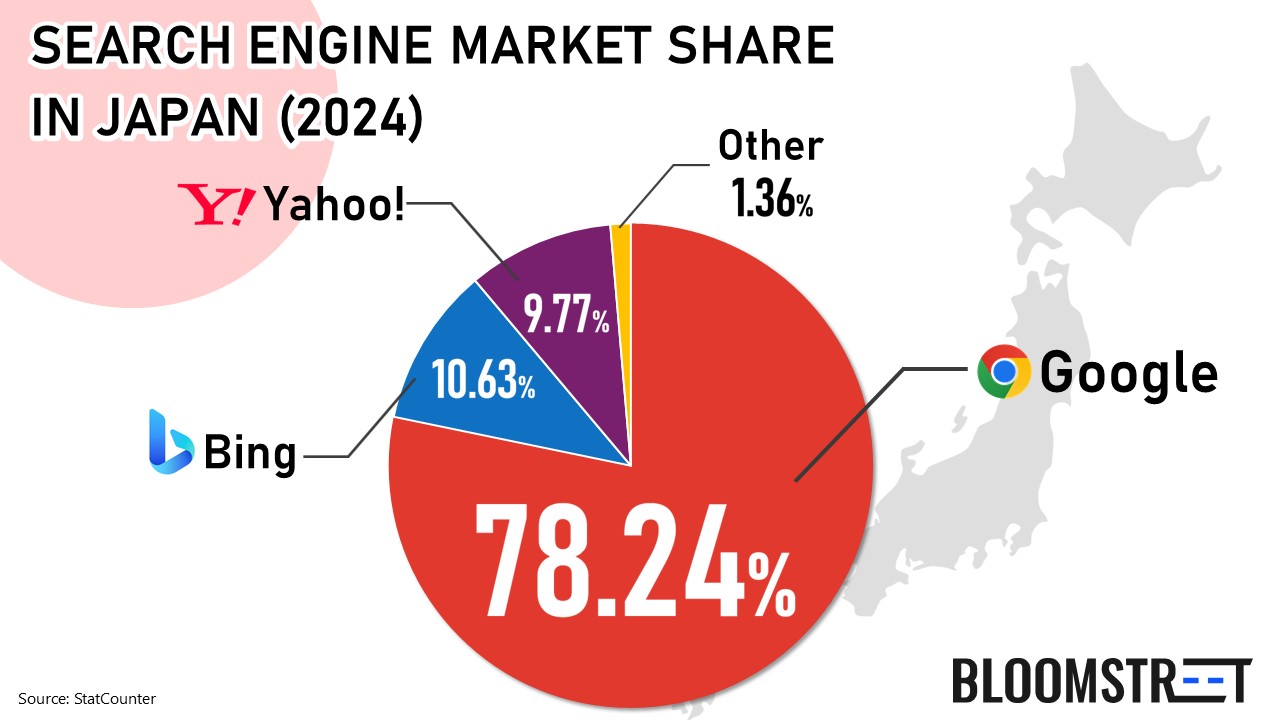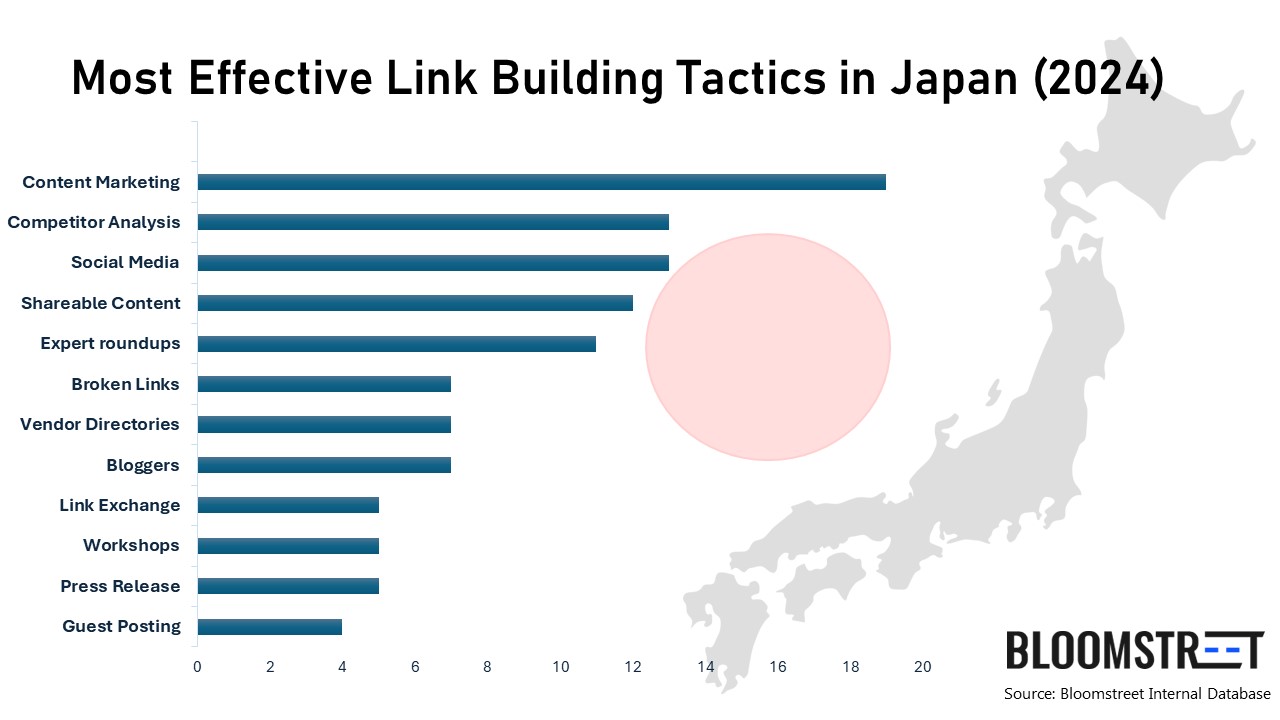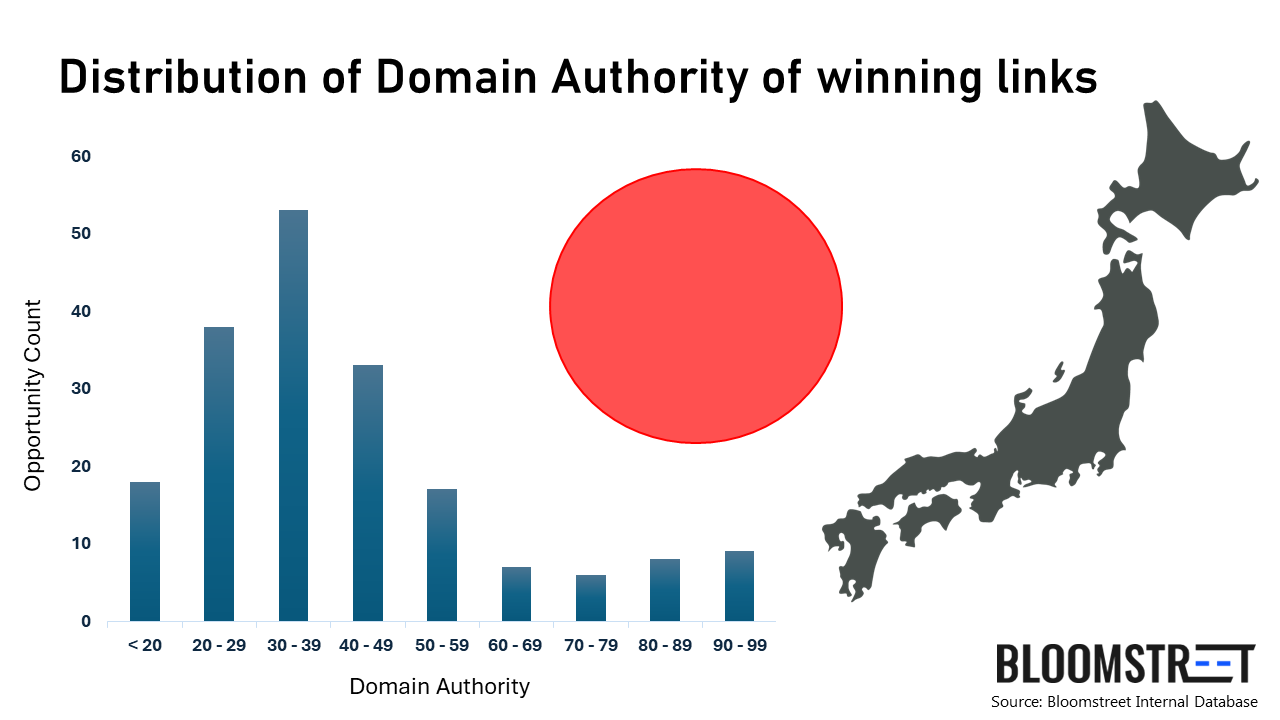The art of Link Building in Japan: The Complete Guide for 2025

The Japanese market is deeply rooted in cultural principles of trust and reputation, which significantly influence link-building strategies.
As a digital Marketing Agency based in Tokyo, we know that Link Building in Japan can be challenging for businesses looking to enhance their online presence in the land of the rising sun.
Our Japanese team has explored various techniques over the years. This article will walk you through our successes and will also detail less effective approaches we’ve tried.
Why link building in Japan is challenging?
Generally speaking, conducting business in a foreign country involves getting familiar with the local culture, the communication style as well as the right way to build relationships.
So yes, it is challenging but before diving into the details, let’s start with the good news first!
Unlike countries like China or South Korea, Google is the #1 Search Engine used in Japan (Bing #2 & Yahoo Japan #3). Since Google is the most popular Search Engine globally, you won’t have to get familiar with a local heavyweight like Baidu in China or Naver in South Korea.

Conducting a link building strategy in Japan is also a good way to build relationships with local partners, isn’t it?
Now let’s focus on challenges:
1 Language Barrier: The Japanese language is unique and quite complex. Based on our experience, websites and links auto translated from a foreign language to Japanese sound robotic and not natural. Creating content that resonates with a local audience requires a deep understanding of the language. A local business will primarily focus on the quality of your website before agreeing to implement a link on its website. Quality is mandatory!
2 Cultural Differences: Understanding Japanese business etiquette and culture is crucial for building relationships with website owners and influencers. Certain sentences are commonly used to show respect, humility and politeness, which are highly valued in the Japanese culture. Even though link building communication is mainly done by email, learning basic business communication is important to show respect and to build harmonious working relationships.
3 Website Structure: We work with western clients so we know that the structure of a Japanese website may be quite surprising for an outsider! Japanese websites often have a very different structure and design philosophy compared to English (and other languages) websites. Here are some general characteristics often observed:
- High Context Design: Japanese websites tend to be high-context, meaning they provide a lot of information on a single page. This can result in busy layouts with multiple columns, text-heavy sections and vibrant colors
- Detailed Navigation: Japanese often feature detailed navigation systems with multiple dropdowns and links to various sections of the site. Japanese are detail-oriented, and websites reflect this cultural trait.
- Animated and flashy Elements: Use of animations, flashing text and graphics is more common compared to their western counterparts.
- Vertical scrolling: Vertical scrolling is prevalent, with pages often being longer than western websites to accommodate the high-context design.
- Local Language and Character Set: Japanese websites prioritize the use of the Japanese language and character set.
- Mobile Optimization: With a high mobile internet usage rate, Japanese websites are typically optimized for mobile devices.
4 Local Search Engines: As we previously mentioned, Google is the #1 Search Engine in Japan. However, Bing & Yahoo Japan shouldn’t be neglected since around 20% of Japanese people are using these Search Engines in 2024. Link Building in Japan requires to comply with Bing & Yahoo algorithms to take full advantage of these Search Engines.
5 Regulations: Japan has strict privacy and internet regulations that may impact link building strategies. Any link building strategy in Japan must comply with the Act on the Protection of Personal Information (APPI). Intellectual Property Rights, Advertising Regulations, Spamming & Consumer Protection must be seriously considered and may impact your Japanese link building strategy.
Conducting digital activities in Japan also require to get familiar with the Act on Regulation of Transmission of Specified Electronic Mail, which regulates obligation to opt in/out and disclosure of the email sender.
The Japanese privacy laws are strict so you should make sure that bloggers, website owners or influencers you may contact disclose their contact information publicly.
6 Negotiations & Relationships:
Establishing business connections in Japan is a long process and understanding the Japanese hierarchy is crucial in the corporate culture of Japan.
Even though you may have very good content to provide them, the final decision to implement a link on their website will be based on consensus, meaning that decisions can take much longer than Western companies.
As mentioned above, hierarchy is also very important in Japan. To navigate the Japanese business hierarchy effectively, you must first accurately identify the status of the people you’re interacting with. This can be particularly challenging while requesting a backlink because you don’t necessarily have email addresses or names of key decision makers.

Some insights about link building in Japan
It’s always interesting to look closely at data when conducting business in a foreign country. We have collected data from our database to highlight the tactics that have driven the best results from link building for the past 2 years in Japan.
At first glance, you’ll quickly notice the Japanese cultural influence on these results. The importance of guest posting is significantly lower compared to what we can see in western countries. Keep scrolling for further details!

Average Domain Authority Rate for Japanese Link Building – Winning Links
Long story short, we evaluate a website authority score on a scale ranging from 1 to 100, with 100 being the pinnacle of excellence. When considering website domain authority, keep in mind that:
- Scores from 30 to 39 are considered moderate but worth linking to, especially for small businesses
- Scores from 40 to 49 are considered good
- Domains ranging from 50 to 60 are considered very good.
- Scores above 60 rate the Domain Authority as excellent
For a small business website that is considering acquiring some backlinks in Japan, a score from 30 to 39 is a very good start. Scores around 40 points can be regarded as quite impressive. Regarding larger corporate websites, the expectations are higher due to greater resources and investment capabilities. A great domain authority score score is anticipated.
Based on our database, 33% of winning links acquired for our international clients based in Japan have a score below 29 and 67% have a score higher than 30.

What are the link building strategies that work in Japan in 2025?
Search engines like Google, Bing or Yahoo Japan are constantly updating their algorithms so it is very important to take into considerations these updates as well as adapting your link building strategy to the local market.
It is also worth noting that your link building strategy in Japan will depend on the industry you target. We noticed that techniques that work for one type of industry may fail completely in another industry so ‘’adaptation’’ is a key component to succeed in link building in Japan.
That being said, here is a list of 9 link building strategies that are quite efficient in Japan in 2025:
1- Local Content Creation:
You already know that good quality content is very important to succeed in link building but in the case of Japan, you will have to focus on developing content that resonates with the Japanese audience. This includes blog posts, infographics and videos that address local interests and are created in the Japanese language.
2 – Guest Posting:
This technique has a lot of potential in 2024 since the competition is very low. Japanese usually don’t do guest posting for cultural reasons but we noticed that more and more website owners now agree to host our own content for traffic purposes.
Being honest and explaining in detail to the website owner the benefits she/he can get from this technique helped us to implement backlinks and increase the website authority of our clients.
3- Competitive Research & Outreach:
SEO tools like Semrush or Ahref will allow you to find out which websites link to your competitors but don’t yet link to you.
Once you identify these articles that talk about your services or products, reach out to website owners and let them know that you can also provide their readers with useful and valuable information. This is a good way to earn good backlinks from high authority Japanese websites.
4- Social Media Engagement:
In 2025, reaching out to website owners, bloggers or influencers through social media platforms to share your content is always a good idea to attract backlinks. In Japan, popular media platforms include Line, Twitter, Instagram or Facebook.
We highly recommend creating an X (ex-Twitter) corporate profile to increase your credibility and maximize your chance to get feedback from key decision makers.
Keep in mind that more than 60 million Japanese people are registered on X. As the population of Japan is estimated at 125 million, this means that nearly 50% of Japanese people have an X account. Japan has the highest percentage of citizens who use the site so there is no need to say that X has a huge potential for Japanese link building.
5- Chambers of Commerce, Associations and Vendor Directories in Japan:
We noticed that some of these websites have high authority and more importantly, some of them will let you post your own content, especially the chambers.
Use a tool like Semrush or Ahref to identify high authority chambers, associations or vendor directories and register to these sites. It is worth noting that some of the chambers will ask you to pay a registration fee but you can then post a significant amount of articles, press releases or news. This is good way to increase your brand awareness and get good quality backlinks from Japanese websites.
6- Leveraging Local Events:
Link building in Japan is primarily an online task but Japanese backlinks can also be acquired by participating in or sponsor local events, workshops or conferences to gain visibility from event-related websites and press releases.
Japanese big cities such as Tokyo, Osaka or Nagoya offer a variety of events that are accessible to English speakers. This is a good opportunity to advertise your business and acquire backlinks from a Japanese website.
7- Interacting Online Tool:
This one is the easiest technique since people are going to work for you! Your content has to be shareable and linkable. We noticed that a resource that serve the Japanese market has a high probability to be shared by one of your local readers.
Japanese people value infographics and images in general. It is worth investing time to create charts, videos, graphs that include Facebook, LinkedIn, X share buttons.
8- The WIN/WIN Solution:
Let’s be honest, there are scenarios where some website owners, bloggers or influencers have nothing to win by implementing an external link to their page.
Our philosophy as a digital marketing agency is to provide our prospects with the WIN/WIN Solution for link building in Japan.
You can for example provide a digital marketing advice to the Japanese website owner in exchange of a backlink. Another common practice is to update broken backlinks with new links that redirect to your website. By providing a link to updated content, they will likely link to your site!
9- Collaboration with Japanese influencers:
Collaborating with Japanese influencers is another effective method of local link building for search optimization. This link building method is quite simple: you contact locally influential bloggers for link building opportunities. Collaborations like online reviews will earn your backlinks.
For such Japanese link building opportunities to be effective, it’s essential that your business and the influencer have a shared target audience and align on core values. The influencer will need assurance that featuring your business won’t tarnish their reputation among their followers. Similarly, from your perspective, it’s crucial to collaborate with influencers whose followers would show an interest in your products or services.

What are the link building strategies to avoid in Japan in 2025?
As mentioned above, link building in Japan requires a very specific approach. Some techniques may be very effective in the US or Europe and completely fail in Japan for cultural reasons.
Based on our experience working with local and international clients, these are the link building strategies you should avoid in Japan in 2025:
1- Providing a content that doesn’t resonate with the Japanese audience
This one is obvious but it’s surprising how many foreign companies here in Japan don’t fully grasp their ideal customer’s profile and motivations. We always advise doing market research before reaching out to a website owner or a blogger. Again, the idea behind link building is to provide valuable content to your business partner. Content that lacks personalization and is crafted for an undefined audience tends to be ineffective.
Again, Japanese work culture is detail oriented so paying attention to small things and details is very important. Make sure that your site is optimized enough to attract local website owners or bloggers.
2- Use a translation software for emails
The Japanese language is complex, especially when it comes to use Kanji, Hiragana and Katakana to write an email.
An email translated in Japanese from a translation software is very easy to identify. Even though the syntax may be correct, it usually sounds robotic, and it won’t help you to build a trustable relationship with a website owner.
Japanese also use a proper business language to communicate with each other and your email may sound inappropriate (or even disrespectful) by using a translation software.
We always recommend hiring a Japanese native speaker to reach out to your prospects.
3- Building Satellite sites to increase authority of the main site
This technique was quite popular in Japan a decade ago but we no longer recommend building satellite sites in 2025. These so called ‘’Satellite sites’’ are separate websites that are created to link back to your main site to potentially improve search engine rankings.
It sounds like a nice idea (and it was working 10 years ago) but search engines like Google have become more sophisticated in identifying and penalizing low-quality link building tactics. It is now important to ensure that any satellite sites provide valuable content and are relevant to your main site’s topic to avoid being flagged as manipulative.
It’s also worth noting that building satellite sites requires resources and time to maintain. If the content on these sites is not useful to users or is seen as an attempt to manipulate search rankings, it could harm your main site’s reputation and rankings.
4- Paying for Links
As for the rest of the world, paying for links as a shortcut for SEO success in Japan is not a good idea.
We do not recommend this strategy to anyone.
When you buy links, you lack control over their final placement and as you already know, site authority is a key component for backlinks. Often, these services will place your links on sites that have no relevance to your own, without using appropriate context or anchor text.
Google explicitly warns that buying links could be judged as a link scheme, which might significantly affect your site’s position in search engine results pages (SERPs).
5- Directory Registration
Registering on these free sites was a very popular SEO technique during the 2000s. The Google algorithm is way more smarter than 20 years ago and now focus on E-A-T (expertise, authoritativeness, and trustworthiness).
The authority score of these online directories is usually low and it may negatively impact your site’s reputation by implementing backlinks on these sites. We do not recommend this Japanese link building strategy. This advice is also relevant for any Google users overseas.
6- Trading Links
Many content marketers mistakenly believe that trading links is a good option, they’re wrong. You’ve probably already received the following request: ‘’I will link to your content and you link to my content’’.
While an occasional link exchange might be harmless, Google views “excessive link exchanges” as a manipulative tactic. Moreover, creating partner sites for the purpose of cross-linking is frowned upon by Google.
It’s important to avoid these practices as they can be considered part of a link scheme, potentially leading to negative repercussions for your site’s search engine rankings.
Conclusion:
New entrants in the Japanese market usually claim that link building in Japan is a challenging task! And yes, they are right!
However, keep in mind that the key is to focus on quality over quantity, and to ensure that your strategies align with the preferences and behaviors of the local audience. Building relationships and providing value are at the core of these techniques.
If you need help to acquire inbound links from Japanese websites, you can contact us and we’ll be happy to help you!
About Bloomstreet
Bloomstreet is a digital marketing agency based in Tokyo that integrates functions to help foreign companies doing business in Japan.
We maximize lead generation in Japan with our unique methods, communicating closely with both headquarter and Japanese branch office.
You can go to our Japanese Link Building Services for more information.
About the Author

Junichi Takayama
CEO
Experienced in studying abroad and working in New York as a web marketer. Joined Alibaba Japan to gain knowledge from their Chinese headquarters.
Have excellent knowledge and understanding of SEO as well as digital marketing, specialized in South Korea and China.
